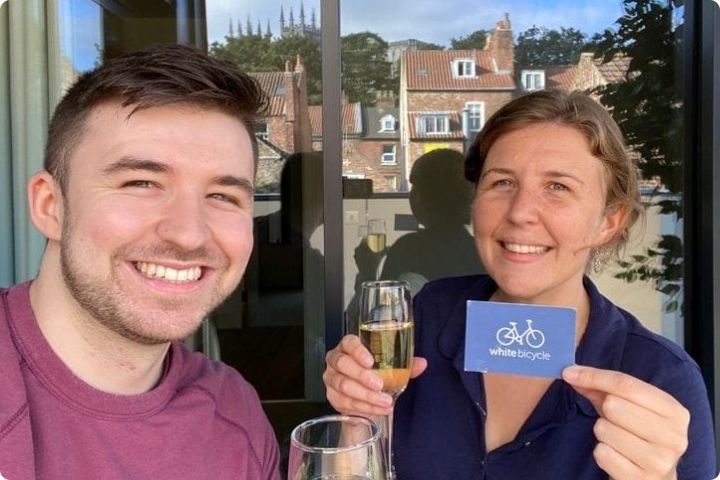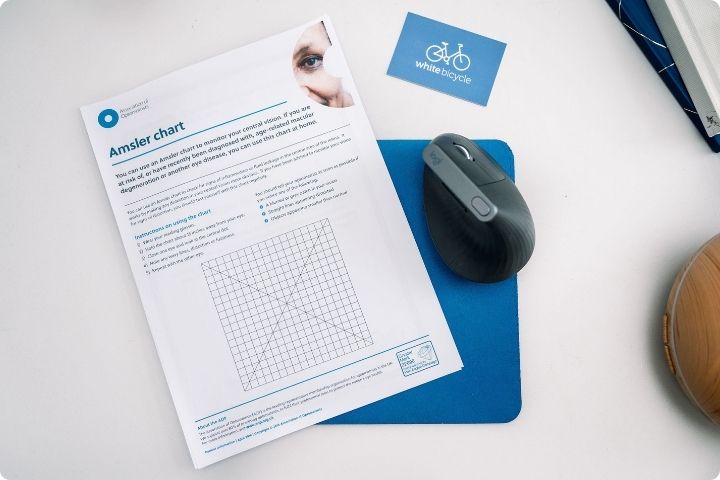All Articles
5 min read
E-learning That Works for Everyone

Written by
Leah Holroyd
Published on
October 10, 2024
On World Sight Day (10th October 2024) is a global event designed to draw attention to blindness and vision impairment. It was originally initiated by the SightFirstCampaign of Lions Club International Foundation in 2000. There are around 1.1 billion people worldwide living with an untreated or preventable visual impairment.
When someone loses their sight, it affects their entire life. For a child, sight loss can mean missing out on their education and the opportunity to make friends and develop social skills. For an adult, it can mean losing their independence and income. In the UK, more than 2 million people live with sight loss and around 340,000 people are registered as blind or partially sighted.
On World Sign Day 2024, we wanted to share Leah’s story of sight loss and how that led her to set up a family company championing accessible and inclusive education and training. Leah Holroyd of White Bicycle Ltd spoke to us about her incredible journey.
White Bicycle
At White Bicycle, we believe that the best education and training are accessible and inclusive. E-learning has the potential to reduce barriers for many learners – but only if it’s designed and built with accessibility in mind from the start. We draw on our lived experience of sight loss to make accessibility central to our mission.
A Bit About Me
When I graduated, I knew I wanted to do something relating to education… But after a couple of years working in a primary school, providing one-to-one support to children with Special Educational Needs (and getting covered in PVA glue and glitter in the process), I decided that teacher training wasn’t the right path for me.
I got a job with a spinout from Imperial College London which developed online courses for universities. After 4 years working there, I was ready for a change of scene and as luck would have it, one of our customers – the University of Canberra in Australia – was recruiting for an Educational Designer…
I loved my job in Canberra, especially working with teaching staff in the Faculty of Health to explore ways to make learning more engaging and effective through approaches like gamification, Augmented Reality, and live interaction tools. I even had my photo taken by The Canberra Times for an article about Virtual Reality…
Sadly, after a couple of years there was a university-wide shake-up and the nature of my role was set to change dramatically. I sensed that it was time to move on. When I came back to the UK, I decided to give freelancing a go, having always wondered what it would be like to be my own boss…
A Family Business
When my younger brother Finn finished university, I asked him if he’d be up for helping me with my freelance work while he applied for grad schemes. In the months that followed, we realised we’d stumbled on an opportunity! We enjoyed working together, our clients were happy, and Finn brought new skills that complimented mine like filming and editing video. In December 2019 we took the plunge and set up a company together.

The company name was inspired by family holidays in the Netherlands, where we would pick up a white bicycle and go off and explore. We felt that it reflected some of our values as a company – things like the freedom to choose your own path and the flexibility to go at your own speed, which is one of the great advantages of online self-paced learning!
Sight Loss
Finn had been diagnosed with Best disease (a form of macular degeneration that causes central vision loss) in his teens. Since the condition is so rare (research suggests between 1 and 9 in every 100,000 people are affected) and no one else in the family had noticed any issues with their eyesight, we all assumed that Finn was the only one of us who had it.
But in 2021, I noticed some fuzziness in my central vision, while working on an animation. I’d created a female cartoon character, but whenever I looked at this character’s face, I could see lots of little speckles… Had I given her stubble!? It took me a while to realise that the issue was my eyes. At first, I thought it might just be eye strain from long days staring at the computer. But when the fuzziness didn’t go away, I knew I had to get it checked out.
To cut a long story short, I was finally diagnosed with Best disease too. The first doctor I saw was incredibly unhelpful. When I asked him for a prognosis, he shrugged and said, “It probably won’t be a real problem until your 40s, and you’ll never go completely blind, you just won’t be able to read, write or recognise people’s faces.” I was in my mid-30s at the time – and a big fan of being able to do all of these things!
I was very lucky that I had Finn to talk to. He was always willing to listen and answer my questions. Although we have the exact same genetic mutation, we’ve found that Best disease affects us in different ways. I think this is something that surprises people – sight loss can take so many different forms and even two people with the same diagnosis on paper can have very different experiences.

Accessibility in Focus
Accessibility has always been an important element of my work, but being diagnosed with a sight loss condition marked a turning point. When it’s something that affects you personally, it feels more urgent and meaningful. I guess that’s selfish – but I try to move beyond that selfish self-interest and use my experience to raise awareness, educate, and advocate for others too.
As well as embedding accessibility into our e-learning work, we run accessibility training and carry out digital accessibility audits. I think we’re good at talking about accessibility in a way that encourages openness – it’s vital that people can ask questions and admit when they’re not sure about something. I’m very open about the fact that I’m still on a learning journey with accessibility too.
As part of that journey, we had some of our e-learning audited by an amazing social enterprise called Diversity & Ability. They were so impressed with our work and our passion that they’ve been collaborating with us ever since. With D&A, we’ve built online disability inclusion modules for Sony Pictures, the UN World Food Programme, and now Transport for London / London Underground.
A lot of people don’t really understand what “accessibility” means, that it isn’t just a fluffy concept or about making something publicly available. There are specific standards (the Web Content Accessibility Guidelines or WCAG) which cover things like colour contrast, captions, keyboard navigation, and so on. The choices you make about colour, text, layout etc have such a big impact on whether your target audience can access, understand and interact with the content you put online. This can feel challenging if you’re just getting started with accessibility, but it’s about progress over perfection – we know that some accessibility issues can’t be fixed overnight, but we want to work with people to get them moving in the right direction. The other great thing is that accessible design benefits everyone, not just those with disabilities like sight loss. As other advocates have said: inclusive design is just better design.
To learn more, you can connect with Leah on LinkedIn, visit the White Bicycle website or sign up to the White Bicycle newsletter to receive recommendations, reviews and more in relation to accessible learning.
Related Disability Awareness Articles
From Skies to a New Reality
Redefining Accessibility with Adaptive Clothing
From Braille Beginnings to a Thriving Business
